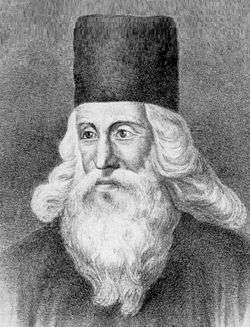Sulkhan-Saba Orbeliani
სულხან-საბა ორბელიანი Sulkhan-Saba Orbeliani | |
|---|---|
|
Portrait of Sulkhan-Saba Orbeliani | |
| Born |
November 4, 1658 Tandzia, Kingdom of Kartli, Safavid Empire |
| Died |
January 26, 1725 (aged 66) Moscow, Russian Empire |
| Occupation | writer, thinker, statesman, prince |
| Nationality | Georgian |
| Period | Reign of King Vakhtang VI of Kartli |
| Genre | poem, dictionary |
| Notable works | A Book of Wisdom and Lies |
|
| |
| Signature |
 |
Prince Sulkhan-Saba Orbeliani (Georgian: სულხან-საბა ორბელიანი) (1658-1725) was a Georgian writer and diplomat. Orbeliani is noted in part due to his important role as an emissary of Georgia to France and Vatican, where he sought assistance on behalf of his beleaguered King Vakhtang VI to no avail.[1] In modern-day Georgia, the story of Orbeliani's diplomatic mission to France would become a symbol of how the West neglects Georgian appeals for assistance.[2]
Biography
Sulkhan Orbeliani was born into the House of Orbeliani, with close ties to the Georgian royal Bagrationi dynasty. He was a great figure of the Renaissance; he was a remarkable fabulist, great lexicographer, translator, diplomat and scientist. The words of one of the French missioner, Jean Richard, brilliantly conform to his great authority among his contemporaries, "I believe him to be the father of all Georgia."
Sulkhan Saba Orbeliani was born on 4 November 1658, in Village Tandzia near Bolnisi in the Kvemo Kartli. He spent his childhood and adolescence there. He was brought up at court of King Giorgi XI and got encyclopedic education due to the Great Palace Library. When he was 20–25 years old he wrote a collection of fables and tales “Sibrdzne Sitsruisa” (A Book of Wisdom and Lies), which is a fruit of his observation over life. The reader feels how ably, deliberately and naturally the great creator interlaces some idea, intelligence and results of living observations in humans and animals. He knows the human nature, all its strong and weak points well. He describes various sides of human actions; he gives answers to many questions and you realize that a human should create kindness in his life.
The next his work is The Georgian Dictionary which contained the encyclopedic elements excels with its advanced methodology and plenty of actual material (it is necessary to emphasize that “the world does not know the encyclopedia yet. Collection of these words is a great treasure. The first volume was published in 1754; The French Academy published the French language dictionary only in 1685” A. Jikia)
His immortal genius is mostly shown in his works, which became the most popular monuments of the Georgian literature together with “The Knight in the Panther's Skin" (the poem of the 12th century of the greatest Georgian poet and philosopher Shota Rustaveli). We can say a lot about his immortal works, but it is impossible to reproduce everything in a few pages. Therefore, I would emphasize only some significant episodes from his biography.
Sulkhan Saba Orbeliani was an educator of the King of Kartli Vakhtang VI. Remarkable poet and scientist Vakhtang VI was the leader of the great movement initiated for intellectual renaissance of Georgia. They founded a lot of glorious deeds in the cultural sphere. In 1709 the first printing-house was established, where for the first time the Gospel and “The Knight in the Panther's Skin ”, were printed. During this period the Georgian chronicles were collected and it became the basis of the Georgian historiography. We see Sulkhan Saba Orbeliani in the center of the political and social life of the country together with Vakhtang VI. Sulkhan was searching methods of releasing of the country from Osmans. In 1698 Sulkhan became a monk at the Monastery David Gareji. Since then he was called Sulkhan-Saba.
Sulkhan-Saba Orbeliani appealed to the West for assistance. The growth of his state authority was crowned with his diplomatic missions. The route of travel of the great Georgian figure was as follows: Constantinople, Marseilles, Paris, Rome, and other cities of Italy and finally back to Georgia through Constantinopol and Turkey. In Paris Sulkhan-Saba appeared before Ludwig XIV and in Italy before the Papa Clemente XI. They knew that he was considered to be the Father of all Georgia and therefore they treated him as an honourable guest. He again appeared before Louis XIV. He made a good impression at the French court with his manners, eloquence, business proposals, showing great diplomatic talent. This is what kind of admiration his visit caused at the court of the French king: ”It is happiness that we have got an advantage to see the Wisdom of Solomon and divine grace with our own eyes in the person of Your Greatness”. France promised assistance to Georgia, but the pages of history did not keep the facts, certifying this great will. Soon Louis XIV deceased. The ruling circles in France changed and relations with countries of the Near East became aggravated. Concrete historical circumstance made the travel of Sulkhan-Saba unsuccessful, his attempts to bring Georgia and states of Western Europe together turned out to be all in vain.
Religion
Before becoming a monk of David-Garedja Monastery 1698 under the name Saba, he converted to the Roman Catholic Church (1692). He originally practiced his new religion in secret. After 1703 he made spreading the Catholic faith in Georgia a major policy of King Vakhtang VI, who had been his pupil. In 1713-1714 he made a journey to the Holy See and to France. He visited Pope Clement XI and King Louis XIV and requested aid from them for King Vakhtang and the Catholic Faith in Kartli (East-Georgian Kingdom). After his return to Kartli he actively began trying to spread Catholicism in Georgia. Therefore, was Georgian Orthodox Church very hostile to him and persecuted him. In 1724 he fled with King Vakhtang to the Russian Empire. Prince Sulkhan-Saba Orbeliani was the creator of a new literary Georgian language. His dictionary for the language is still essential for those who wish to learn Georgian today.
Bibliography
- Sulkhan-Saba Orbeliani Georgian dictionary (with commentary of I. Abuladse). VI-II, Tbilisi, Merani, 1991/1993
- A. Baramidze, Sulxan-Saba Orbeliani : c'xovreba da literaturli mogvaceoba ; nark'vevi. Tbilisi: Sabtschota Saqartvelo 1959 (geo).
- M. Tarchnisvili, J. Assfalg: Geschichte der kirchlichen georgischen Literatur: Auf Grund des ersten Bandes der Georgischen Literaturgeschichte von K. Kekelidze. Biblioteca Apostolica Vaticana, Città del Vaticano 1955 (ger).
- M. Tamarashvili: History of Catholicism among the Georgians. Tbilisi 1902, passim (geo.).
References
- ↑ Kalistrat Salia. History of the Georgian Nation. 1983, p. 315
- ↑ Bruno Coppieters, Alekseĭ Zverev, Dmitriĭ Trenin. Commonwealth and Independence in Post-Soviet Eurasia. 1 January 1998, p. 16
